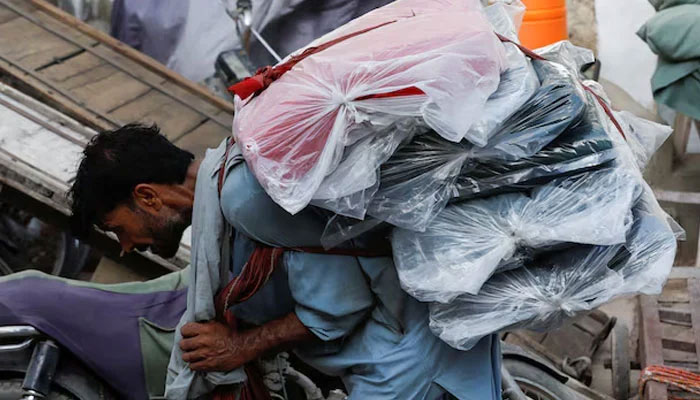The tale of taxes
LAHORE: Higher taxes rarely boot traders or manufacturers out of business as they recover every tax (even fixed taxes imposed on traders) from end consumers. Hapless consumers, in most cases, forgo some essential needs to cover their expenses.
The aftermath of the recent budget announcement has sparked widespread discontent among traders and manufacturers, who are vehemently urging the government to roll back new taxation measures. Despite their protests, they have uniformly raised prices slightly above the impact of these taxes, citing the need to cover costs and add profit margins.
In Pakistan’s retail markets, the principles of a free market economy rarely apply. Instead of following the principle of supply and demand, entrepreneurs often resort to practices of hoarding and price manipulation. Rather than responding to supply and demand dynamics, these so-called entrepreneurs engage in stockpiling.
During periods of surplus, they release goods slowly to maintain high prices, while during shortages, they exploit high demand to maximize profits. This behaviour raises significant concerns about the efficacy of price regulatory bodies, which some allege are complicit in these practices.
The manufacturing sector manipulates supplies to keep rates high. If we analyze the manufacturing capacities of different sectors, it will be found that there are excess installed capacities in cement, sugar, flour mills, and edible oil. Some of these capacities are efficient and some are highly inefficient.
Under the principle of a free market economy, efficient manufacturers should have kicked inefficient ones out of the market. But it is not happening in Pakistan, as inefficient mills are surviving because of manipulation of production by all in accordance with market demand.
Efficient producers mint money and get richer while inefficient ones survive because efficient producers keep the rates sufficiently higher than the cost of inefficient producers that helps them survive.
All these industries enjoy protection from imports, which makes it impossible to bring in these commodities when global prices are much lower.Food-related industries, despite catering solely to domestic demand, maintain production capacities that far exceed local needs. They have no export market, but even then, they have registered mushroom growth. Flour mills, for instance, produce three times the required wheat flour, yet competition remains absent among them.
Similarly, inefficient sugar mills and edible oil units continue operations because retail rates are set to ensure their profitability, passing the burden of higher taxes directly to consumers.They do protest higher taxes but face no threat of survival as the taxes are passed on to the end consumers. In many cases, they also underreport production to cheat both the government and consumers (they cheat the government by not paying taxes on their production and cheat consumers by claiming unpaid taxes from them).
The exorbitant costs of health services in Pakistan stem from a lack of government oversight in the private sector and transparency in public sector health centres. Charges for procedures like heart or orthopaedic surgeries in private hospitals can be 10-50 times higher than those in public facilities. Additionally, income derived from patient fees often goes unreported in tax returns, exacerbating disparities and financial burdens on patients. The ongoing economic turmoil underscores deep-seated issues in Pakistan’s regulatory framework and market practices, necessitating urgent reforms to ensure fair competition, transparency, and affordability across sectors.
-
 Northern Lights: Calm Conditions Persist Amid Low Space Weather Activity
Northern Lights: Calm Conditions Persist Amid Low Space Weather Activity -
 'Look What Andrew Has Done': Meghan Markle Defended On Jeremy Vine Show
'Look What Andrew Has Done': Meghan Markle Defended On Jeremy Vine Show -
 Apple, Google Agree To Make 'app Store' Changes Over UK Regulator Concerns
Apple, Google Agree To Make 'app Store' Changes Over UK Regulator Concerns -
 Autodesk Files Lawsuit Against Google Over AI Video Tool Trademark Dispute
Autodesk Files Lawsuit Against Google Over AI Video Tool Trademark Dispute -
 San Francisco 49ers Player Shot Near Post-Super Bowl Party
San Francisco 49ers Player Shot Near Post-Super Bowl Party -
 Kardashian-Jenner Clan Brings Lewis Hamilton Into The Fold: Watch
Kardashian-Jenner Clan Brings Lewis Hamilton Into The Fold: Watch -
 Meghan Markle 'quietly Dreaded' As Ex-best Friend Receives Lucrative Offer For Bombshell Memoir About Duchess
Meghan Markle 'quietly Dreaded' As Ex-best Friend Receives Lucrative Offer For Bombshell Memoir About Duchess -
 Blake Shelton, Gwen Stefani Make Big Move To Save Their Marriage
Blake Shelton, Gwen Stefani Make Big Move To Save Their Marriage -
 Google Warns Of State-sponsored Cyberattacks Targeting Defense Sector Employees
Google Warns Of State-sponsored Cyberattacks Targeting Defense Sector Employees -
 Ransom Deadline Passes: FBI Confirms ‘communication Blackout’ In Nancy Guthrie Abduction
Ransom Deadline Passes: FBI Confirms ‘communication Blackout’ In Nancy Guthrie Abduction -
 Jeff Bezos Hints At Blue Origin Moon Plans As Elon Musk Responds With Cautious Praise
Jeff Bezos Hints At Blue Origin Moon Plans As Elon Musk Responds With Cautious Praise -
 Zach Bryan Slams Turning Point USA Alternative Halftime Show: 'Embarrassing As Hell'
Zach Bryan Slams Turning Point USA Alternative Halftime Show: 'Embarrassing As Hell' -
 South Korea Blames Coupang Data Breach On 'management Failures,' Not Cyber Attack
South Korea Blames Coupang Data Breach On 'management Failures,' Not Cyber Attack -
 ‘Disgraced’ Andrew More Concerned About ‘issue Of His Legacy’ Than Epstein Links
‘Disgraced’ Andrew More Concerned About ‘issue Of His Legacy’ Than Epstein Links -
 Instagram Plans New Snapchat-style App ‘Instants’ Amid Rising AR Competition
Instagram Plans New Snapchat-style App ‘Instants’ Amid Rising AR Competition -
 Safer Internet Day 2026: Is Social Media Ban The Only Way To Protect Kids?
Safer Internet Day 2026: Is Social Media Ban The Only Way To Protect Kids?




